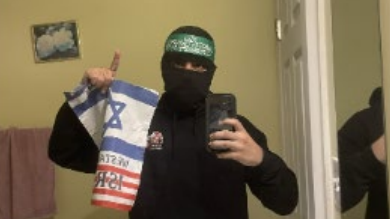According to a criminal complaint unsealed in the Western District of Pennsylvania, Mohamad Hamad, a self-described “Hamas operative,” has been accused of vandalizing Jewish buildings in Pittsburgh, Pennsylvania and purchasing explosive materials. His accomplice, Talya Lubit, is also facing charges related to defacing and damaging religious real property. Hamad is a dual citizen of the United States and Lebanon who was a member of the Pennsylvania Air National Guard until he was barred from the facility in 2024. Lubit is a U.S. citizen residing in Pittsburgh.
The vandalism incidents targeted a synagogue and a Jewish organization, with messages such as “Jews 4 Palestine” and “Funds Genocide Jews, Hate Zionists” being spray-painted on the buildings. Surveillance video showed Hamad purchasing red spray paint before the vandalism and his vehicle near the crime scenes. Lubit, a recent graduate and Jewish activist, has been accused of being Hamad’s accomplice in the vandalism. Both individuals have been linked to anti-Israel sentiments and activism, including supporting controversial resolutions and politicians critical of Israel.
Court documents reveal that Hamad donated to “Squad” members Ilhan Omar and Rashida Tlaib, who have been vocal critics of Israel. Messages exchanged between Hamad, Lubit, and others on an encrypted messaging app show their anti-Israel sentiments and planned activities, including purchasing explosive materials and discussing potential explosions. Hamad referred to himself as a “Hamas operative” and shared images supporting the militant group, including one with a U.S.-Israeli flag and a symbol associated with Islam.
The investigation into Hamad and Lubit’s activities also revealed disturbing messages and images shared by Lubit in a group chat. Lubit expressed sentiments of seeing Jews as enemies and shared an image of the Nazi swastika in the middle of an Israeli flag. The evidence gathered by law enforcement suggests a deep-seated animosity towards Jews and Israel, culminating in acts of vandalism and plans for potential violent actions. The case underscores the importance of addressing radical ideologies and hate-driven actions within communities.
The connection between the accused individuals and their support for anti-Israel causes and politicians raises concerns about the influence of extremist ideologies in society. The incidents of vandalism and the planned explosive activities highlight the dangers posed by individuals radicalized by such beliefs. Efforts to combat hate speech, violent extremism, and anti-Semitic actions must be prioritized to prevent further incidents of this nature. Authorities are working to ensure that those responsible for the crimes face justice and that steps are taken to address the underlying causes of such radicalization.
The case involving Mohamad Hamad and Talya Lubit in Pittsburgh serves as a reminder of the ongoing threat posed by individuals with extremist views and their potential to carry out violent acts. The close monitoring of radicalized individuals, the enforcement of laws against hate crimes, and the promotion of tolerance and understanding are essential in combating such threats. The incidents of vandalism and potential violence committed by the accused individuals should serve as a wake-up call to society to address the root causes of radicalization and work towards building a more inclusive and peaceful community for all.













